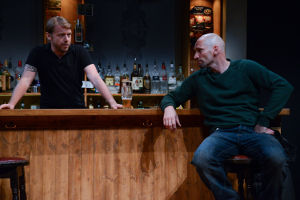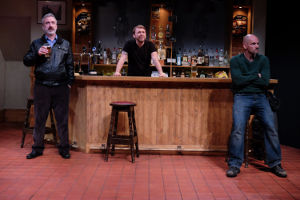
BEATE HEIN BENNETT
|
Nobody Goes Quietly Into This Good Night
A neighborhood bar in Belfast, Northern Ireland, sometime in 2009, a soccer match between Poland and Northern Ireland plays on the TV, a solitary bar-tender watches, alternately f..ing in English the Polish team or mumbling something in Polish in response to a text message on his cell phone, or playing on the poker machine, all in mild irritation. Aggressive children’s voices are vaguely heard through the closed door leading off-stage right, when a bald man bursts through that door and heads straight for the bar. He gets his pint and offers to get rid of the kids outside with a pointed comment “kids can do more damage than you think.” The two men spar with each other in semi-jest: Robert, the Polish bartender, played by the Polish actor Robert Zawadzki, and Jimmy, the bald Belfast man, played by Patrick O’Kane. While they’re watching the match on the virtual TV above the audience, their subject of conversation circles ever tighter around soccer, Poland, Belfast, and an uncertain sense of belonging.
Director Jimmy Fay subtly establishes a tense mood from the outset; there is no doubt that the next 75 minutes will pass “quietly.” One can sense that the banter is about much more. Patrick O’Kane plays Jimmy like a coiled spring ready to lunge at any time—he is all muscle and sinews with a gaunt face-- more skull than face-- whose sneer matches the cutting voice that slices the text into chunks of raw facts and emotions. He expects to meet with a man in this bar and that “there might be trouble.” About ten minutes into the play the other man, Ian, played by Declan Conlon, warily enters the bar; he scans the place and keeps his distance –a blistering silence holds everyone in thrall for what seems an eternity. When he is about to sit down at the bar for his order of two pints of Harp, Jimmy lunges at him from across the stage and head-butts him to the floor. Now the real match starts. The lives of these two men are as entangled as the political geography of Belfast has entangled the Catholic and Protestant population for the past hundred years. .
McCafferty ‘s play is literally a verbal “slow dance on the killing ground” with the two men confronting each other and the horrendous actions committed and experienced as adolescents on the behest of hateful adults—Ian threw the bomb into the bar that killed Jimmy’s father and four other men. In the play both are fifty-two year old men dealing with the permanent existential fall-out of the events when both were sixteen. When face to face, both come eventually to some understanding of the spiritual death that each suffered as a consequence of those actions in that same neighborhood bar in 1974 during another soccer match watched on the TV that Jimmy’s father had carried down the street from home. The playwright offers neither a facile reconciliation nor a false solution. He seems to say the best one can do is listen and witness the proceeding, as does the bar-tender Robert behind his bar with a mix of wordless sympathy and awe. Perhaps by talking with (not to or at) each other and listening to the other, we begin to “understand each other.” However, as long as the shouting of mythical national heroism slogans and the shrill abuse of “the other” prevail—in the Northern Irish lingo “Fenian bastards” (Pro-Republican Catholic Irish) versus “Orange bastards” (Pro-British Protestant Irish) or vice versa—no talk will be heard only bombs. A soccer match ends with a score of winners and losers; in a civil war all lose. The two men in the play are the living corpses of a society that has persisted in conflict. The Abbey production with Fay’s tight mis-en-scene in a fully equipped bar (set design by Alyson Cummins and lighting by Sinead McKenna) and the cast of three superb actors gives us a sharp rendition of the human cost of such conditions of mutual alienation and hate-mongering. The Irish Repertory Theatre and The Public are to be congratulated for having made it possible for New York audiences to see this superb work of theatre in the Irish Rep’s intimate new space in Chelsea. |
| museums | NYTW mail | recordings | coupons | publications | classified |


